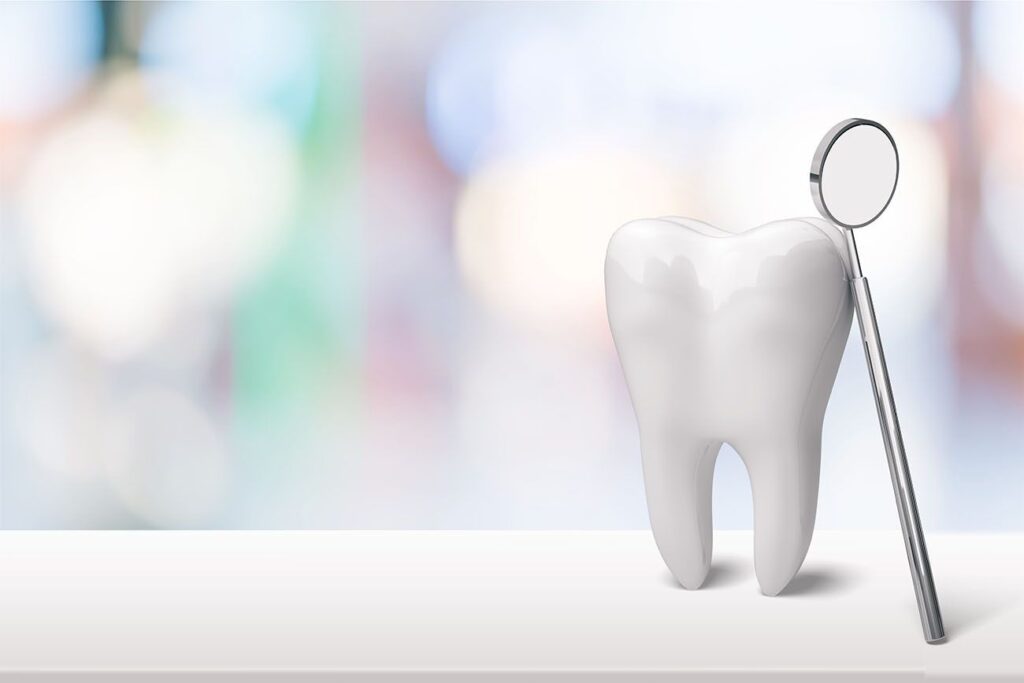For many of us, a steaming cup of coffee is the perfect way to kick-start the day as part of our morning routine.
However, if you’ve ever winced in pain while sipping your favorite brew, you might be experiencing tooth sensitivity. Unfortunately for us coffee lovers, there is a connection between coffee and tooth sensitivity.
Coffee contains caffeine, which can contribute to dental issues such as enamel erosion and increased tooth sensitivity.
Don’t despair! You can enjoy your coffee without discomfort in many ways.

What Causes Tooth Sensitivity?
To understand tooth sensitivity, it’s helpful to know a bit about tooth anatomy. Our teeth have a protective outer layer called enamel. This shields the sensitive inner layers, including dentin and pulp.
When this enamel wears down or becomes damaged, it exposes the dentin that has tiny tubules that lead to the nerves inside the tooth. This allows sensations like heat from coffee to travel further into your tooth and cause pain.
So, how does coffee come into play?
Coffee is an acidic beverage, and its acidity can contribute to enamel erosion. Coffee has a pH ranging from approximately 4.5 to 5.5, which is acidic enough to demineralize tooth enamel over time. When the enamel wears away, the dentin becomes more exposed, leading to increased sensitivity. Enamel wear is a common cause of sensitivity and discomfort. Regular consumption of coffee can result in an increased risk of cavities and sensitivity due to its acidic nature.
Drinking coffee over a long period can cause cumulative enamel damage and heightened sensitivity. Additionally, coffee contains tannins. These compounds compound the staining potential and worsen sensitivity.
Understanding Tooth Sensitivity
Tooth sensitivity manifests as a sharp, sudden pain or discomfort—often described as a sharp pain—when teeth are exposed to certain stimuli, such as hot, cold, sweet, or acidic foods and beverages.
If you experience a twinge of pain when sipping your morning coffee or biting into an ice cream cone, you might have tooth sensitivity, with tooth pain being a common symptom.
Gum Recession and Tooth Sensitivity
Gum recession is a leading cause of tooth sensitivity, especially when enjoying hot or cold foods and beverages like coffee. When gums recede, the sensitive roots of your teeth become exposed, making them much more vulnerable to temperature changes and acidic drinks.
The American Dental Association notes that gum recession can result from aggressive brushing, poor oral hygiene, or even genetics. Once the roots are exposed, you may notice increased sensitivity when drinking your morning cup of coffee or eating cold foods.
To help prevent gum recession and the resulting sensitivity, it’s important to practice gentle dental care. Use a soft-bristled toothbrush and avoid aggressive brushing, which can wear away both enamel and gum tissue. Limiting your intake of acidic foods and beverages, such as sports drinks, can also help protect your gums and enamel from erosion. Regular dental checkups allow your dentist to monitor your gum health and catch early signs of recession, helping you maintain a comfortable, pain-free smile.
Recent Dental Work and Sensitivity
If you’ve recently had dental work—such as fillings, crowns, or whitening treatments—you might notice a temporary increase in tooth sensitivity. This is a common reaction, especially when consuming hot or cold beverages like coffee. The Texas Dental Association recommends using a desensitizing toothpaste to help ease this discomfort while your teeth adjust. It’s also important to follow your dentist’s post-procedure instructions carefully to support healing and minimize sensitivity.
While this type of sensitivity usually fades within a short period, persistent or severe discomfort should not be ignored. If you continue to experience sensitivity after dental work, reach out to your dentist to ensure there are no underlying issues that need attention. Taking these steps can help you get back to enjoying your favorite drinks without pain.
Tips for Enjoying Coffee with Sensitivity
While you don’t have to give up your beloved coffee entirely, there are steps you can take to minimize discomfort:
-
Use a Straw: Drinking coffee through a straw, especially when enjoying iced coffee, can help minimize contact between the coffee and your teeth. This method helps protect sensitive areas of your teeth and reduces your exposure to enamel-eroding acids.
-
Limit Coffee: Consider reducing the frequency of coffee consumption or opting for smaller servings to lessen the impact on your teeth.
-
Rinse with Water: After enjoying your coffee, rinse your mouth with water to help neutralize acids and wash away any residue. Swishing water in your mouth after drinking coffee can be particularly effective in reducing the harmful effects of acidity.
-
Avoid Brushing Immediately: Wait at least 30 minutes after consuming coffee before brushing your teeth. This allows the enamel to remineralize and reduces the risk of abrasion.
-
Choose a Low-Abrasive Toothpaste: Look for toothpaste designed for sensitive teeth. These contain ingredients that help block the tubules in the dentin, reducing sensitivity.
Protecting Your Tooth Enamel
Aside from modifying your coffee habits, it’s crucial to protect your tooth enamel to prevent further sensitivity. Here are some tips:
-
Good Oral Hygiene: Brush your teeth twice a day with fluoride toothpaste, and floss daily to remove plaque and prevent decay.
-
Use a Soft-Bristled Toothbrush: A soft-bristled brush is gentle on enamel and less likely to cause abrasion.
-
Wear a Night Guard: If you grind your teeth at night, a night guard can also protect your enamel from damage.
Desensitizing Toothpaste and Its Benefits
Desensitizing toothpaste is specially formulated to help those experiencing tooth sensitivity, particularly when enjoying hot or cold beverages like coffee. This type of toothpaste works by blocking the tiny tubules in the dentin that lead to the nerves, reducing the sensation of pain. For coffee drinkers who find that their teeth hurt when sipping their favorite brew, using a toothpaste designed for sensitive teeth can make a noticeable difference.
The American Dental Association recommends choosing a desensitizing toothpaste with the ADA Seal of Acceptance, ensuring it meets high standards for safety and effectiveness. With regular use, desensitizing toothpaste can help reduce discomfort, allowing you to enjoy both hot and cold drinks with less worry. If you’re struggling with sensitivity, talk to your dentist about the best toothpaste options for your needs.
When to See Your Dentist

If you’re experiencing persistent tooth sensitivity, it’s essential to see your dentist. They can determine the underlying cause and also recommend appropriate treatment. In some cases, sensitivity may be a sign of a more serious dental issue, such as tooth decay, gum disease, or recent dental procedures like a root canal.
Why Tooth Sensitivity Varies During the Day
Many people notice their teeth feel more sensitive at certain times, especially in the morning. This happens because saliva production slows down overnight, leaving teeth with less natural protection. Additionally, gum tissue swells slightly during sleep, which can expose more of the tooth’s root surface. Caffeine is a diuretic that can reduce saliva production, resulting in a dry mouth. This lack of saliva exacerbates sensitivity, particularly when consuming acidic beverages like coffee.
As the day continues and saliva flow increases, teeth become less sensitive. Some people drink coffee throughout the day to maintain energy, which can affect sensitivity levels depending on when and how often they consume it. This explains why that first cup of coffee in the morning often causes the most discomfort. To minimize sensitivity, waiting an hour after waking before drinking coffee can help. Additionally, using sensitive toothpaste before bed can help strengthen enamel overnight.
Lower-Acid Coffee Alternatives for Sensitive Teeth
For coffee lovers with sensitive teeth, there are ways to enjoy coffee without as much enamel damage. Mushroom coffee, though it has a unique taste, contains natural compounds that reduce acidity. Chicory root coffee offers a similar roasted flavor with less risk to teeth. Some coffee brands now sell specially processed low-acid varieties, which can be easier on enamel.
For those who prefer traditional coffee, choosing arabica beans over robusta (which has nearly double the acidity) or brewing with alkaline water can make a difference. With these alternatives, even people with sensitive teeth can still enjoy coffee without as much discomfort or long-term damage.
